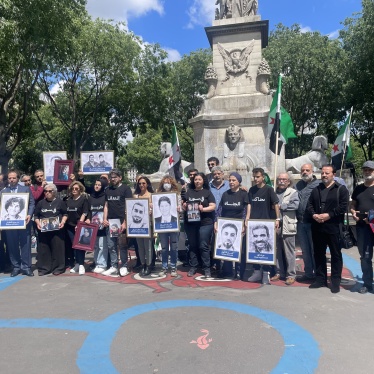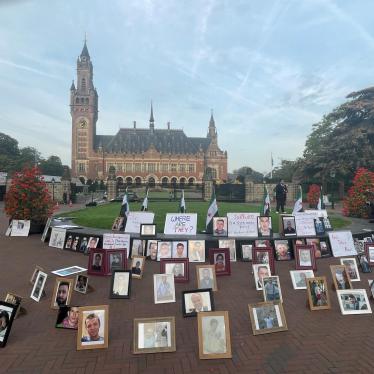(The Hague) – Syria has failed to comply with an International Court of Justice (ICJ) order a year ago directing it to take all measures within its power to prevent acts of torture in the country, Human Rights Watch said today. The World Court issued provisional measures on November 16, 2023, in a case brought by the Netherlands and Canada alleging that Syria is violating the international Convention against Torture.
Human Rights Watch research shows that Syrians remain at risk of enforced disappearance, death from torture, and horrific detention conditions. One year after the ICJ’s order, Human Rights Watch has published a feature article highlighting the efforts of Syrians to pursue accountability for ongoing abuses.
“Syrian officials are still sending people to the country’s detention centers, which are notorious for torture,” said Balkees Jarrah, associate director for international justice at Human Rights Watch. “Despite the odds, Syrian families and survivors remain determined in their struggle for justice, whether through the world’s highest court or other avenues.”
The case, filed in June 2023, cited unlawful treatment of detainees, inhumane detention conditions, enforced disappearances, sexual and gender-based violence, violence against children, and the use of chemical weapons as evidence that Syria is violating the Convention Against Torture. The case is not a criminal proceeding against individuals but seeks a legal determination of state responsibility for torture.
Recent reports by Human Rights Watch, other human rights groups, and a United Nations-mandated inquiry indicate that Syrian authorities continue to engage in abusive practices in contravention of the International Court’s order.
In an August 2024 report, the Syrian Network for Human Rights documented the deaths of at least 43 people due to torture since the ICJ issued its order. In its latest two reports, covering the period from late 2023 to July 2024, the UN Independent International Commission of Inquiry on the Syrian Arab Republic noted that the Syrian government continues to “commit acts of torture and ill-treatment against persons in State custody, including practices causing death in detention.”
Separately, the UN special rapporteur on torture and other cruel, inhuman or degrading treatment or punishment stated in July that “information available alleges that torture continues to be practiced widely […] in detention centers operated by the Syrian Government.” The UN expert described the Syrian government’s response to her information request about reports of ongoing violations and measures taken to carry out the order as “entirely inadequate,” failing to “address any of the allegations specifically.”
The ICJ also directed Syria to take measures to ensure the preservation of any evidence related to torture or other prohibited acts. But Syrian nongovernmental groups and the UN Commission of Inquiry have raised concerns that a recent legislative move by the Syrian authorities dissolving the country’s Military Field Courts could be an attempt to dispose of or hide evidence of a long list of abuses, including torture.
Canada and the Netherlands have until February 3, 2025, to submit their main written pleadings in their case against Syria. The court’s provisional measures order does not prejudge the merits of the allegations that Syria has violated provisions of the torture convention.
Syria has consistently denied torture allegations in spite of years of evidence reported by UN bodies and independent nongovernmental organizations, including Human Rights Watch, which found that crimes in Syria’s detention facilities amount to crimes against humanity.
Syrians, including those who have decided or been coerced to return from other countries where they had taken refuge, are exposed to risk of enforced disappearances, arbitrary detention in horrific conditions and torture.
Although a number of European governments have contended that parts of Syria are safe for refugee returns, the research by Human Rights Watch and others indicates that it is not. Countries hosting Syrian refugees should immediately halt any forced or summary returns or any plan to facilitate or incentivize such returns, Human Rights Watch said.
The migration policies pressing Syrians to return home are at odds with court decisions in EU member states, which have found Syrian authorities responsible for torture and other abuses amounting to crimes against humanity and war crimes. These cases were possible because of laws that recognize universal jurisdiction over certain of the most serious crimes under international law.
Universal jurisdiction allows for the investigation and prosecution of these crimes no matter where they were committed and regardless of the nationality of the suspects or victims. It remains one of the few viable pathways to justice for crimes committed in Syria.
“The past year has only confirmed the horrific blueprint the Syrian government has used for over a decade now: detain, disappear, torture, and kill,” Jarrah said. “Governments should urgently use their leverage to ensure that Syria abides by the World Court’s order and support all efforts to pursue justice for ongoing abuses.”






